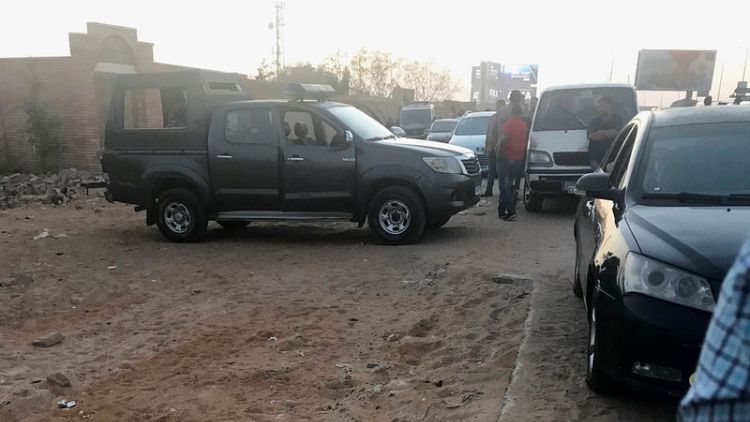By Aidan Lewis and Amina Ismail
CAIRO (Reuters) - Modern Egypt's first democratically elected leader, Mohamed Mursi, was buried in a small family ceremony on Tuesday, a day after suffering a fatal heart attack in court at a Cairo prison, his sons said.
The Islamist ex-president's death after six years in jail under the military-backed establishment that ousted him in 2013 was likely to stoke the anger of his supporters in Egypt and abroad.
His Muslim Brotherhood, now banned in Egypt, described it as "full-fledged murder" and called for mass gatherings. Egyptian officials denied accusations that his health had been neglected.
Mursi was laid to rest in Cairo next to other leaders of the Brotherhood, his son Abdullah Mohamed Mursi told Reuters.
"We washed his noble body at Tora prison hospital, read prayers for him at the prison hospital," another son, Ahmed Mursi, wrote on Facebook.
Witnesses in Mursi's home province of Sharqiya said hundreds of residents in the village where he was born had performed prayers for Mursi amid tight security on Tuesday, and afterwards chanted "Down with military rule!". A number of residents were detained, a security source said.
Life appeared normal in the capital, where authorities have cracked down on Islamists and other activists since Mursi's overthrow. Egyptian media, which are tightly controlled, gave the news little attention - only one newspaper, the privately owned Al-Masry Al-Youm, mentioned him on its front page.
But hundreds of Muslim Brotherhood members in Turkey took to the streets of Ankara and Istanbul, some of them blaming Egyptian authorities for the death.
Mursi died on Monday, aged 67, after collapsing in a Cairo court while on trial on espionage charges.
He had been in jail since being toppled after barely a year in power, following mass protests against his rule, and had been sentenced to more than 40 years on charges including leading an outlawed group, spying for a foreign country and terrorism.
ADDRESS TO COURT
In an address to the court lasting about 15 minutes, shortly before his collapse, he protested his innocence of the latest charges, objected to his detention, and said he was unable to defend himself because of rules around state secrets, according to a person present at the hearing.
Mursi had come to power in 2012 at the height of the Arab Spring pro-democracy movement after the overthrow of the autocratic veteran president Hosni Mubarak - albeit as the Brotherhood's second-choice candidate, with little relevant experience.
His year in office was turbulent, bringing accusations that, rather than cementing the pluralistic democracy that many protesters had sought, he had sought to entrench Islamist rule with a new constitution that vastly expanded his powers.
As millions took to the streets in protest, Abdel Fattah al-Sisi, then military chief and now president, seized power, threw Mursi and most of the Brotherhood leadership in jail, and began a clampdown on opposition in which hundreds were killed.
Authorities say the Brotherhood remains a threat to security and quickly raised security levels after Mursi's death.
The Brotherhood says it is a non-violent movement but, following a request from Sisi, U.S. President Donald Trump is working to designate it a foreign terrorist organisation.
Mursi's death is likely to increase international pressure on the government over its human rights record, especially conditions in prisons. At least 60,000 people, including much of the Brotherhood's leadership, have been jailed on political grounds, according to a Human Rights Watch estimate.
A British parliamentary panel said last year that Mursi had received inadequate medical treatment for diabetes and liver illness and was being kept in solitary confinement, which could put his life in danger.
Amnesty International called for an investigation, saying Egyptian authorities had "an appalling track record of detaining prisoners in prolonged solitary confinement and in dire conditions as well as subjecting prisoners to torture and other ill-treatment".
The U.N. human rights office called for an independent investigation into all aspects of Mursi's treatment in custody.
"MEDICAL NEGLIGENCE"
Mursi's son Abdullah said the family had been able to visit only three times since 2013, and that his father had suffered from "gross medical negligence".
Egypt's State Information Service, which liaises with foreign media, said Mursi had submitted his last official request regarding his health in November 2017, asking to be treated at his own expense. It said the court approved the request, and that an official report from the same year had found Mursi was suffering from diabetes but otherwise healthy.
Leftist former presidential candidate Hamdeen Sabbahi said he had heard of Mursi's death "with great sadness and deep sorrow".
Amr Darrag, minister of planning and international cooperation under Mursi, called for an "independent and transparent international investigation" into his death.
"The Egyptian people will not let this crime pass lightly," he said.
Turkey's president, Qatar's emir and the Palestinian Islamist group Hamas all paid tribute to Mursi, while Iran expressed regret at his death.
But ordinary Egyptians were sharply divided; Brotherhood supporters accused opponents of "gloating" over Mursi's death.
Tawakkol Karman, joint recipient of the Nobel Peace Prize for her advocacy of women's rights and democracy in Yemen, said: "I mourn, for myself and all the free people of the world, the death of a great striver on the path of freedom."
(This story corrects paragraph 24 to make clear that Amr Darrag is former, not current, minister of planning and international cooperation)
(Reporting Amina Ismail, Mohamed Abdellah, Ali Abdelaty, Lilian Wagdy, and Ahmed Tolba; Writing by Aidan Lewis and Sami Aboudi; Editing by Samia Nakhoul and Kevin Liffey)
